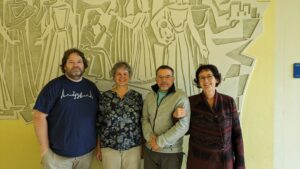Latin
“The future needs origins.”
(Odo Marquardt)
Subject chair: Birgit Scheiter (Sche)
Latin is not a dead language. Latin leads…
- to a more conscious approach to German as a mother tongue or second language.
- to the training of the ability to express oneself in German.
- to a better understanding and handling of foreign and technical words.
- to easier learning of many European languages, as they are derived from Latin.
- to an acquaintance with the political and cultural history of Europe – it is still effective today! (Roman law)
- to a better understanding of the present by comparing it with antiquity, a very different world.
- to acquire knowledge of Latin (Latinum) as a requirement for access to certain courses of study.
… in a few words:
- The language of instruction is German.
- Latin is spoken as it is written; therefore there are hardly any pronunciation and spelling problems.
- It is translated from Latin into German. The Latin texts are examined and analysed in detail.
- The Latin texts are read, interpreted and related to the students’ own world.
- Integration of digital media.
Our subject curriculum provides a detailed insight:
Subject curriculum Latin
Latin does not only take place in the classroom.
We go on trips and excursions to: Xanten, Cologne, Kalkriese, Haltern am See, Focke Museum Bremen, Kunsthalle Kiel, Helmsmuseum Hamburg, Bucerius Kunstforum Hamburg and attend court hearings.
We also visit the cinema, theatre or opera.
We take a closer look at Itzehoe’s city history by deciphering Latin inscriptions, working out city tours and studying Latin sources.
Finally, cooking Roman dishes together is also part of the programme.
[pdf-embedder url=”https://www.avs-itzehoe.de/wp-content/uploads/2021/09/Wann-hat-man-welches-Latinu1.pdf” title=”When do you have which Latin certificate?”]
1) Certamen Cimbricum: http://www.certamen-cimbricum.de/
2) Certamen Creativum: https://www.dav-nord.de/wettbewerbe/certamen-creativum
| Teacher | Second subject |
|---|---|
| Mrs Göbel | Greek, Performing Arts (Drama) |
| Mr Reinke | Music lessons |
| Mrs. Scheiter | Protestant Religion |
| Mrs Schürmann | German |
| Mr Wienrich | History |
Teaching principles: subject requirements and curricula
http://www.lehrplan.lernnetz.de/index.php?DownloadID=795
http://www.studservice.uni-kiel.de/sta/studienqualifikationssatzung.pdf
Useful external websites
http://www.mbradtke.de/index0.htm
http://lucius-hartmann.ch/unterricht/altesprachen/uebungen/
http://de.pons.com/

